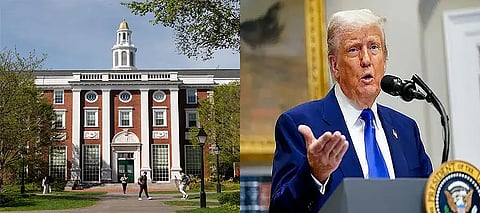

In a massive development, the Trump Administration on Thursday night (India Timing) revoked the prestigious Harvard University's eligibility to enroll foreign students. US Homeland Security Secretary Kristi Noem late on Thursday night ordered the Department of Homeland Security (DHS) to revoke Harvard University's Student and Exchange Visitor Program (SEVP) certification with immediate effect. To regain the eligibility to admit foreign students, Harvard will have to provide information about existing foreign students within 72 hours. All foreign students currently studying at the university have been asked to transfer to other institutions. Otherwise, they may have to leave the country.
Amid the Trump vs Harvard tussle, the question arises, how will it impact the Indian Students? Another question is how many Indian students are currently studying at Harvard, and what's next for them? Below is what we know so far-
As per reports, there are nearly 6,800 international students at Harvard, including nearly 800 students from India. Reports further suggest that between 500 and 800 Indian students and scholars are enrolled each year across its various schools and departments.
788 Indian students are currently studying at Harvard, most in graduate-level programmes. Following the Trump administration's latest order, these students must now transfer to another SEVP-certified institution if they intend to remain legally in the United States. Failure to do so could result in visa revocation and potential deportation.
Many Indian students are enrolled in long-term doctoral or multi-year graduate programmes, and transferring mid-course could be academically disruptive.
While Harvard is historically known for producing scholars and many dream to study there, True Scoop brings you a list of alternatives, i.e., Harvard's alternatives where Indian students can think of applying if they don't want to leave the United States-
Notably, like Harvard, other Ivy League colleges are SEVP-certified like- Stanford University, Massachusetts Institute of Technology (MIT), Yale University, Princeton University, Columbia University.
Other top-rated universities/colleges that are SEVP-Certified are- University of Chicago, California Institute of Technology (Caltech), University of Pennsylvania (UPenn), Duke University and Northwestern University
Notably, students can verify if a school is SEVP-certified through the official U.S. Department of Homeland Security site: SEVP Certified School Search.
For the past few days, there was a tussle between Harvard and the government over the records related to foreign students. DHS had said in April that if Harvard did not provide the complete record of illegal and violent cases of foreign students by April 30, its SEVP certification would be taken away. The administration is not satisfied with the record given by the university.
Harvard University has about 27% foreign students. Currently, about 6,800 foreign students are studying there. Among these, there are 788 students from India. Most of the students are on an F-1 or J-1 visa. The F-1 visa is for students studying in American educational institutions, while the J visa is for exchange visitors, including scholars, researchers.
The administration’s action is part of a broader political and ideological conflict between President Donald Trump and elite US institutions that his administration accuses of promoting antisemitism, harboring pro-Hamas sympathies, and enforcing discriminatory diversity policies.